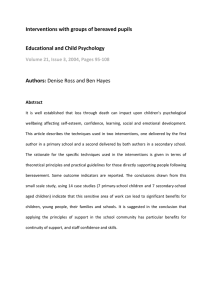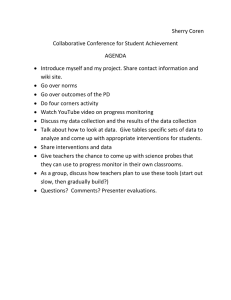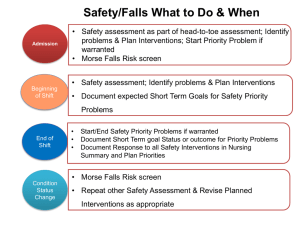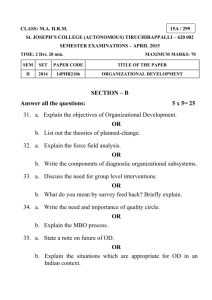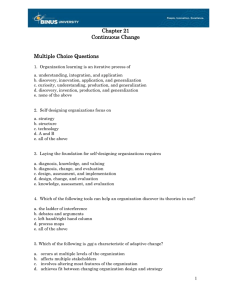Chapter Twenty One : Continuous Change Organization Development and Change Thomas G. Cummings
advertisement
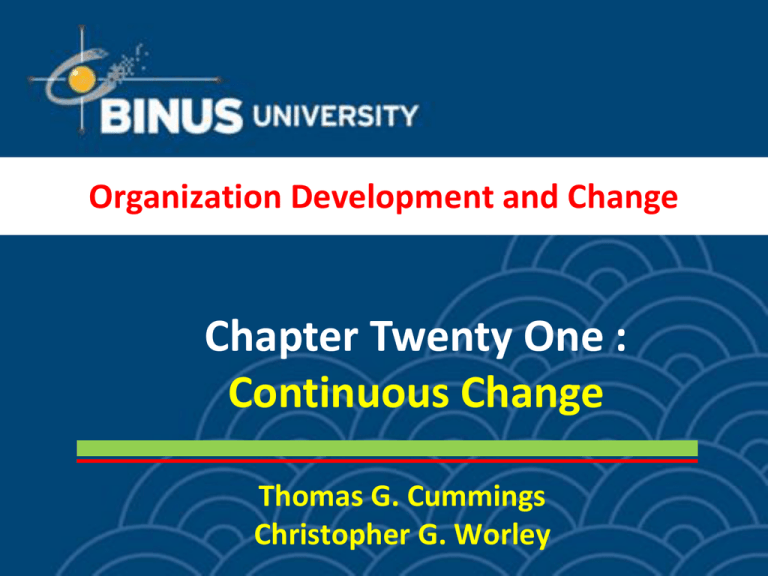
Organization Development and Change Chapter Twenty One : Continuous Change Thomas G. Cummings Christopher G. Worley Learning Objectives for Chapter Twenty One To understand OD interventions that enable organizations to continuously change To compare and contrast three different types of OD interventions aimed developing organizations capable of continuous change interventions: self designing organization interventions, organization learning and knowledge management interventions, and built to change organization interventions HS 21-2 Self-Designing Organizations Systemic change process altering most features of the organization Process is ongoing, never finished—continuous improvement and change Learning as You Go—on-site innovation Need support of multiple stakeholders All levels of the organization adopt new strategies and change behaviors HS 21-3 The Self-Design Strategy Laying the Foundation Acquiring Knowledge Designing Implementing and Assessing Diagnosing Valuing HS 21-4 Organization Learning & Knowledge Management Organization Learning interventions emphasize the structures and social processes that enable employees and teams to learn and share knowledge Knowledge Learning focuses on the tools and techniques that enable organizations to collect, organize, and translate information into useful knowledge HS 21-5 Organization Learning: An Integrative Framework Organization Learning Knowledge Management Competitive Strategy Organization Characteristics Organization Learning Processes Organization Knowledge Structure Information Systems HR Practices Culture Leadership Discovery Invention Production Generalization Tacit Explicit Organization Performance HS 21-6 Characteristics of a Learning Organization Structures emphasize teamwork, information sharing, empowerment Information systems facilitate rapid acquisition and sharing of complex information to manage knowledge for competitive advantage Human resources reinforce new skills and knowledge Organization culture encourages innovation Leaders model openness and freedom to try new things while communicating a compelling vision HS 21-7 Organization Learning Processes Single loop learning Most common form of learning Aimed at adapting and improving the status quo Double loop learning Generative learning Questions and changes existing assumptions and conditions Deuterolearning Learning how to learn Learning how to improve single and double loop learning HS 21-8 Discover Theories in Use Dialogue Action Maps Left-Hand, Right-Hand Column The Ladder of Inference HS 21-9 The Ladder of Inference I take ACTIONS based on my beliefs I adopt BELIEFS about the world I draw CONCLUSIONS I make ASSUMPTIONS based on the meanings added I add MEANINGS (cultural and personal) I select DATA from what I observe I OBSERVE data and experiences HS 21-10 Knowledge and Performance Organization knowledge must be relevant and applied effectively to the competitive strategy Link organization learning processes to organization performance Growing emphasis on the value of intellectual assets and services HS 21-11 Knowledge Management Interventions Generating Knowledge Identify knowledge for competitive strategy Develop ways to acquire or create that knowledge Organizing Knowledge Put knowledge into a usable form Codification and Personalization Distributing Knowledge Making knowledge easy to access, use & reuse HS 21-12 Built-To-Change Organizations Organizations are designed with the ability to change constantly to create the best sustainable source of competitive advantage. Organizations operate in complex and rapidly changing environments HS 21-13 Built-To-Change Design Guidelines Managing Talent Reward System Structure Information and Decision Processes Leadership HS 21-14 Built to Change Application Stages Create a Change-Friendly Identity Pursue Proximity Build an Orchestration Capability Establish Strategic Adjustment a Normal Condition Seek Virtuous Spirals HS 21-15 2-16


